2020-2022
MAP Nepal worked with child clubs, schools, art-based organisations, research and academic institutions, youth organisations and community groups.
In the initial phase, child clubs conducted problem-identification workshops with their own members. They got the opportunity to participate in a number of arts and research workshops, exchanges and community dialogues. In addition, the child clubs also organised meetings with their parents, teachers and other local stakeholders to collect input. They used problem tree analysis to identify the causes and effects of the identified problems. They identified different art-based tools for presentation and dialogue. Art forms such as video, drama, painting, songs (folk songs: Lokgeet and Deuda) and other arts-based tools were used by child clubs to inform policymakers.
As a result of their constructive and meaningful participation, child clubs produced a number of arts-based and policy outputs. They developed and used creative and art-based materials to sensitize and inform policymakers on those identified problems. Child clubs came up with 7 such policy briefs under their own leadership through regular consultation and engagement with their members. Policy briefs were shared and submitted to respective policymakers, such as local governments, police offices, schools and others.
2023-2024
In September 2023 MAP had a roundtable with UNESCO Kathmandu and together with Youth Advisory Advocacy Reseach (YAAR) produces two Policy (Art) Briefs.
Policy briefs
- Policy
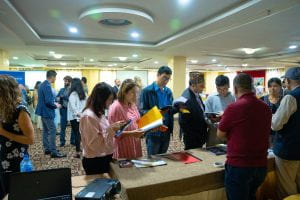
Policy (art) brief: Youth researchers as generational “translators” in educational policy
Here is another creative exploration on the creation of policy brief. This policy art brief looks at the crucial role of youth researchers in bridging the gap between their peers (students) and educational authorities, policy makers, etc. within the education system.
- Policy
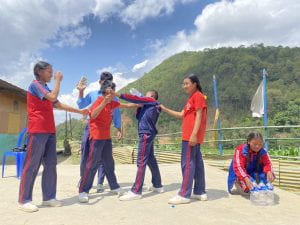
Policy (art) brief: Arts-based methods for youth-led delivery of the Social Science curriculum (Grades 6-8)
Take a look at how youth researchers in Nepal explore creating policy briefs in an artful way. This policy art brief highlights the use of arts-based methods in delivering the social science curriculum to young people, specifically in Years 6-8.
- Policy
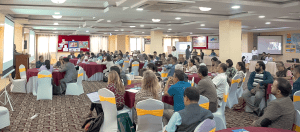
Reports: UNESCO – MAP National Dialogue on Culture & Arts Education Report
Read the final report of the MAP-UNESCO Dialogue Roundtable on September 21 2023. Learn about arts based methods and inter generational approaches towards arts education in Nepal.
- Policy
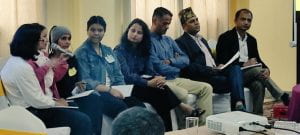
Policy brief: Brief in progress: Informing curricula through arts-based pedagogies
Take a look at this this collaborative brief in progress co-created by the MAP research project team, stakeholders, and YAARs in Nepal. It includes a sample of community curriculum and was presented during the UNESCO-MAP Roundtable in Kathmandu on 21 September 2023
- Policy
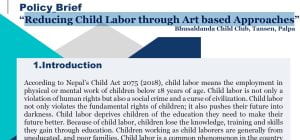
Policy brief: Policy Brief – Reducing Child Labour through Art based Approaches
According to Nepal’s Child Act 2075 (2018), child labour means the employment in physical or mental work of children below 18 years of age. Child labour is not only a violation of human rights but also a social crime and a curse of civilization. Child labour not only violates the fundamental rights of children; it…
- Policy
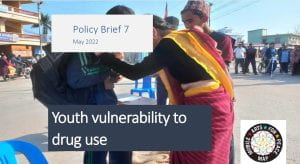
Policy brief: Policy Brief – Youth Vulnerability to Drug Use
There is no specific research that has identified or adequately addressed the needs of young people who use drugs in Nepal and t here is a consensus among drug experts that drug use is rapidly increasing in urban areas of Nepal. Drugs are becoming more accessible and p eople are experimenting with drugs at a…
- Policy
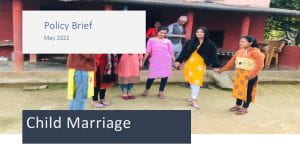
Policy brief: Policy Brief – Child Marriage
Child marriage is a violation of human rights, comprising the development of girls, putting them at risk of abuse and violence, and reinforcing the gendered nature of poverty. Despite attempts by Nepali government and non governmental organizations to end child marriage, Nepal still has one of the highest rates of child marriage in the world.…
- Policy
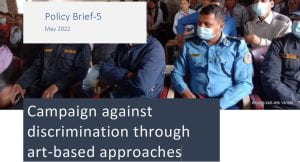
Policy brief: Policy Brief – Campaign against Discrimination through Art-based Approaches
Nepali legislation protects citizens, including young people and children, against all forms of discrimination. However, society still discriminates against people because of their gender or because of their caste. Young researchers in the Janapriya Child Club, Palpa, have explored the issue of discrimination, looking particularly at its root causes. Using arts-based methods, including street drama,…
- Policy
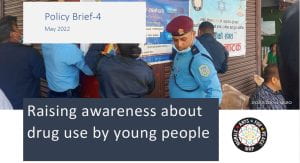
Policy brief: Policy Brief – Raising Awareness about Drug Use by Young People
There are currently no public drug treatment facilities in Nepal, despite significant annual increase sin the number of drug users in the country. Treatment facilities are outsourced to private organizations and provided at a cost that is beyond the reach of most people. This means that legal provisions granting immunity from prosecution to those who…
- Policy
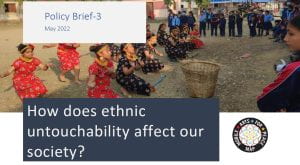
Policy brief: Policy Brief – How Does Ethnic Untouchability Affect our Society
Despite legal protections both in the UN Convention of Children’s Rights and in the Constitution of Nepal caste based discrimination is still a prominent feature of Nepali society. People who are considered of low caste known as ‘Dalits’ or ‘untouchables' are considered lesser human beings. They often face marginalization, social and economic exclusion, an d…
- Policy
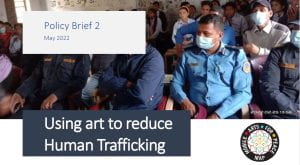
Policy Brief – Using Art to Reduce Human Trafficking
Human trafficking poses a serious challenge to Nepal’s socioeconomic development, and peace building. This policy brief is based on arts based research carried out by young people and provides an outline of the research findings and recommendations to prevent human trafficking. These recommendations are intended to complement the work of the Government of Nepal and…
- Policy
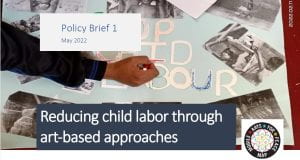
Policy brief: Policy Brief – Reducing Child Labour through Art-Based Approaches
Nepali law prohibits child labour and has set targets to banish all types of child labour by 2025. Child labour is recognized as a violation of human rights, deprives children of education and impacts their future. However, despite this, recent data shows that over 15% of children in Nepal are engaged in child labour. Child…